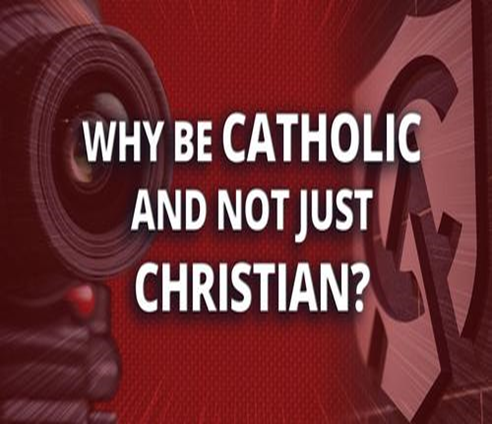- Accueil
- Notre communauté
- Notre foi
- Nos ministères
-
Vie paroissiale
- Calendrier des événements
- St. Aidan's Video Links
- Blog paroissial
- Archives des nouvelles
- Mass Etiquette and Information
- Ad Orientem News and Facts
- Catholic Links
- Prayers and Announcements
- Luis Dizon Reflections - Archive
- Bulletin
- Nous contacter
- Recherche

Why You Can’t be “Just a Christian” By J. Luis Dizon

A common question asked by Evangelical Protestants, especially of the “Non-Denominational” variety, is the following:
“Why do I have to be a Catholic to follow Jesus? Can’t I be just a Christian?”
To someone who asks this, I would reply: The reason you can’t be just a Christian is that there’s no such thing as “just a Christian,” because every Christian accepts certain beliefs and practices that distinguish them from others.
For example, if your church baptizes believers only, then you’re distinguishing yourself from all the churches that baptize infants. Or, if your church ordains women as pastors, then you’re distinguishing themselves from all the churches that ordain men only. Even the most basic things as “Jesus rose from the dead” are distinguishing statements, on account of very liberal churches that profess to be Christian yet deny these basics.
If you say you’re “just a Christian,” you have to show why your way is the default way of being Christian, as opposed to every other way. Also, if you say you’re “just a Christian,” you’re implicitly saying everyone who practices Christianity differently is wrong in some way, so you also have to show why your way is correct, and the others aren’t.
In addition, most of the time, when I ask someone who claims to be a “non-Denominational Christian” what they believe and practice, they turn out to be some flavour of Baptist or Pentecostal. This is not surprising, given that many (though not all) Baptist and Pentecostal churches have a free-church structure where every local church is independent of one another. It seems that many people who identify as “non-Denominational” are unaware of their heritage or in denial about it.
Finally, those who say they’re “just a Christian” practice a form of Christianity that would’ve been foreign to most Christians throughout history. Before the 16th century, most Christians believed in a liturgical and hierarchical church structure with bishops, apostolic succession, the Eucharist, and Sacred Tradition. They wouldn’t have recognized modern non-denominationalism as “Christian,” if they were around today to witness it.
Thus, if you want to follow authentic historic Christianity, you would need all these things in addition to basics such as belief in Jesus’ Lordship and the authority of Scripture. In other words, you have to be a Catholic Christian. To be otherwise is to be a lukewarm Christian, and as Jesus warns in Revelation, if you are neither hot nor cold, then you are lukewarm, and He will spit you out (Revelation 3:15-16).
Related video: Why Be Catholic and Not Just Christian? (by Trent Horn)
